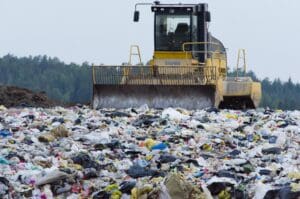How To Keep 133 BILLION Pounds Of Food Waste From Piling Up In A Landfill
Americans Waste An Obscene Amount Of Food Every Year
Earlier this month the U.N. released a report on global food waste. As you could guess, it wasn’t pretty. Worldwide, we waste about 1 billion tons of food a year. For reference, picture 23 million tractor-trailers, filled with food, parked bumper to bumper, circling the planet 7 times. That’s how much food waste we’re talking about here.
And, maybe a little unsurprisingly, it turns out that Americans are the worst offenders of the bunch. Every year the United States throws almost â…“ of our food away. That adds up to about 133 billion pounds (and $161 billion worth) of food that ends up in a landfill every year.
This Amount Of Waste Is Having A Disastrous Impact On The Environment
Half of the topsoil on the planet has been eroded in the last 150 years, much of it due to all the energy and resources that go into producing food that doesn’t get eaten. And farms with less fertile topsoil require more chemical inputs that can create “dead zonesâ€, where the runoff kills local marine life. Not to mention the huge amounts of greenhouse gases that are emitted once the food waste ends up in the landfill.
We can’t go on wasting that much food, it’s not sustainable. But how do we cut down on food waste? What can we do to dampen the environmental impact?
A Good Place To Start Is Better Planning
How much food do you throw away because it went bad before you had a chance to eat it? Or how often do you toss leftovers after pushing them to the back of the fridge all week? I know I do it way too often.
We could cut down on so much food waste just by taking the time to think ahead. It only takes a couple minutes to plan out your meals for the week. Then you end up only buying what you’re going to eat instead of what you think you’ll eat. The end result is less food being thrown out each week.
This is something every person can do today to start limiting food waste. And it’s a great start. But even the best planners still throw out a ton of food scraps like coffee grounds, egg shells, fruit peels, and paper napkins every year.
Composting Could Eliminate Food Waste Altogether
Outside of a landfill, food waste eventually decomposes, but it takes time. Composting speeds up that process and produces a bunch of other benefits along the way. When you toss your food waste into a compost you’re also reducing the need for chemical fertilizers, producing nutrient rich soil and reducing methane emissions.
Making sure our food scraps end up in a compost is hands-down the best way to keep food waste from piling up. If we could get more people to compost, we could really make positive changes to the environment. The only problem is, composting isn’t easy. Unless you have the time, space and resources to devote to maintaining a compost, it’s not practical for most people to do at home.
That’s Why We Offer A Food Waste Pickup Service That Regenerates Farmland
We know how big of an impact composting has on the environment. And we know there are a lot of people out there who understand it too, but aren’t composting for one reason or another.
That’s why R.City exists, to make composting accessible to everyone within the Phoenix Metro area. We want to make it as easy as possible for you to turn your food waste back into farmland. With our food waste pickup service, you get all the benefits of composting without having to do any of the dirty work.
All you have to do is toss your food scraps into your R.City bucket and we’ll exchange it with a clean bin every week. From there, your food waste goes to our farm where we compost it! That compost eventually fertilizes the farm fields and your food scraps become farm-fresh, organically grown produce that we deliver directly to you. It’s a sustainable, full-circle solution to our planet’s food waste problem.
Are You Willing To Do Your Part?
We probably didn’t need a U.N. report to tell us there’s way too much food being thrown away. And we all know how much of a burden it is on our environment. But what are we going to do about it? Because it’s going to take all of us to do our part to reduce (and reverse) the negative impacts of all that waste.
It starts with doing a better job planning. But to really have an impact, we also have to make composting a part of our lives. Whether it’s starting a compost at home or signing up for a food waste pickup service, if more people started composting we could drastically reduce the 133 billion pounds of food waste we produce each year.
